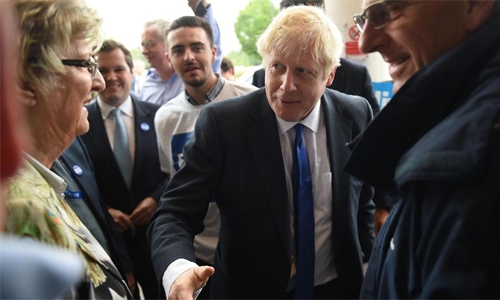Class divides and elitism remain the unresolved legacies
The thing about ruling more than half the world is that it is habit-forming for generations to come. Commentary on British society often revolves around the dominance of the privileged elite in its institutions and economy. While the controversies over the make-up of the establishment are an undoubted aspect of British culture, they are also overblown. In truth, critics bear as much responsibility as anyone else for the failure to make the country a fairer place.
There is scarcely an aspect of British modern life not touched by class warfare. Politics is certainly dominated by the theme. The two men in the final leg of the race to be leader of the Conservative party and therefore prime minister are products of two leading fee-paying boarding schools, Eton and Charterhouse. Both went to Oxford University. Often they don’t help themselves either in closing the class divide.
One of the candidates, former foreign secretary Boris Johnson, suggested last week that he wanted to appeal to Oppidan Britain. Oppidan can mean urban; it more specifically refers to a certain type of Eton pupil who lives in town rather than boards at the school. Mr Johnson himself was the other type, a King’s Scholar, and therefore, by implication, superior. The casual use of the term in an interview with the Spectator magazine, a publication he used to edit, was entirely typical of the Wodehousian Mr Johnson.
It might have been that he was using the word in its original meaning of town-dweller to indicate that he wanted to appeal to the urban electorate. As it happens, a visit he made to the London suburb of Orpington the same day provided an illustration of why Mr Johnson might not have acquired the common touch he needs to win over Britain. At a garden centre, where he triumphantly tweeted he was “out and about meeting the good people of Orpington this morning”, an elderly couple heckled him with the sneer: “Good luck with your preposterous ideas”.
Mr Johnson stayed 15 minutes. Appealing to the ordinary folk of Orpington should be top of his agenda. Figures on the dominance of privilege in the professions and among wealth creators do look horribly skewed. The Sutton Trust recently published its annual mobility survey. It found only seven per cent of British people were privately educated, yet occupied 39 per cent of top positions. In some walks of life, the dominance of the old school tie is overwhelming. A total of 65 per cent of judges and 52 per cent of British diplomats come from similarly privileged backgrounds.
Even the estimated 26 per cent figure for tech entrepreneurs is highly unrepresentative. All walks of life are tainted. Phoebe Waller-Bridge created the hit comedy Fleabag, which critics dubbed “less lovable” because its characters were posh. It should be said that Britain is not unique in having well-connected people rise to the top. When George W Bush became president, he was following in the steps of his father, George HW Bush. Ursula von der Leyen was named the next leader of the European Commission last week in a career move that will trump her father’s, a director-general of the body.
One problem is that the antidote to class divides was discarded in a triumph for left-wing social orthodoxy. One of the best political quips in the last 15 years was Conservative leader Michael Howard’s jibe at Labour’s Tony Blair about schooling. “This grammar schoolboy is not going to take any lessons from that [private] schoolboy on the importance of children from less privileged backgrounds gaining access to university,’’ he declared.
The post-war generation of schoolchildren, who had access to grammar schools, was far more upwardly mobile than the next generation, who were swept up in the great experimental democratisation of the education system with the introduction of comprehensives in the 1960s. The following generation was further hampered by the introduction of a loans-dominated university system. Among the Sutton Trust recommendations to close the social gap is opening up Oxford, Cambridge and other top institutions to a wider student pool.
It called for the adoption of “contextual recruitment and admissions practices”. This suggests the adoption of affirmative action programmes rather than a meritocracy. There was a warning this week that a shift in this direction could harm Britain’s global influence at just the wrong time. Sir Mark Lyall Grant, a former national security adviser and ambassador to the UN, described universities as a pillar of Britain’s global soft power, adding that their appeal would diminish if the focus on excellence was diluted.
Sir Mark’s ancestors, it should be noted, were responsible for lending their name to Pakistan’s third largest city Faisalabad, originally known as Lyallpur, under the British Raj. The empire entrenched the private school system as a production line for a cadre of administrators to be posted across the globe. It is still producing kings and captains of industry. Resolving how to supersede rather than entirely demolish the legacy of empire remains an unresolved conundrum. Spare a thought for those not fulfilling their true potential as the damaging class warfare debate rages on.
Related Posts

